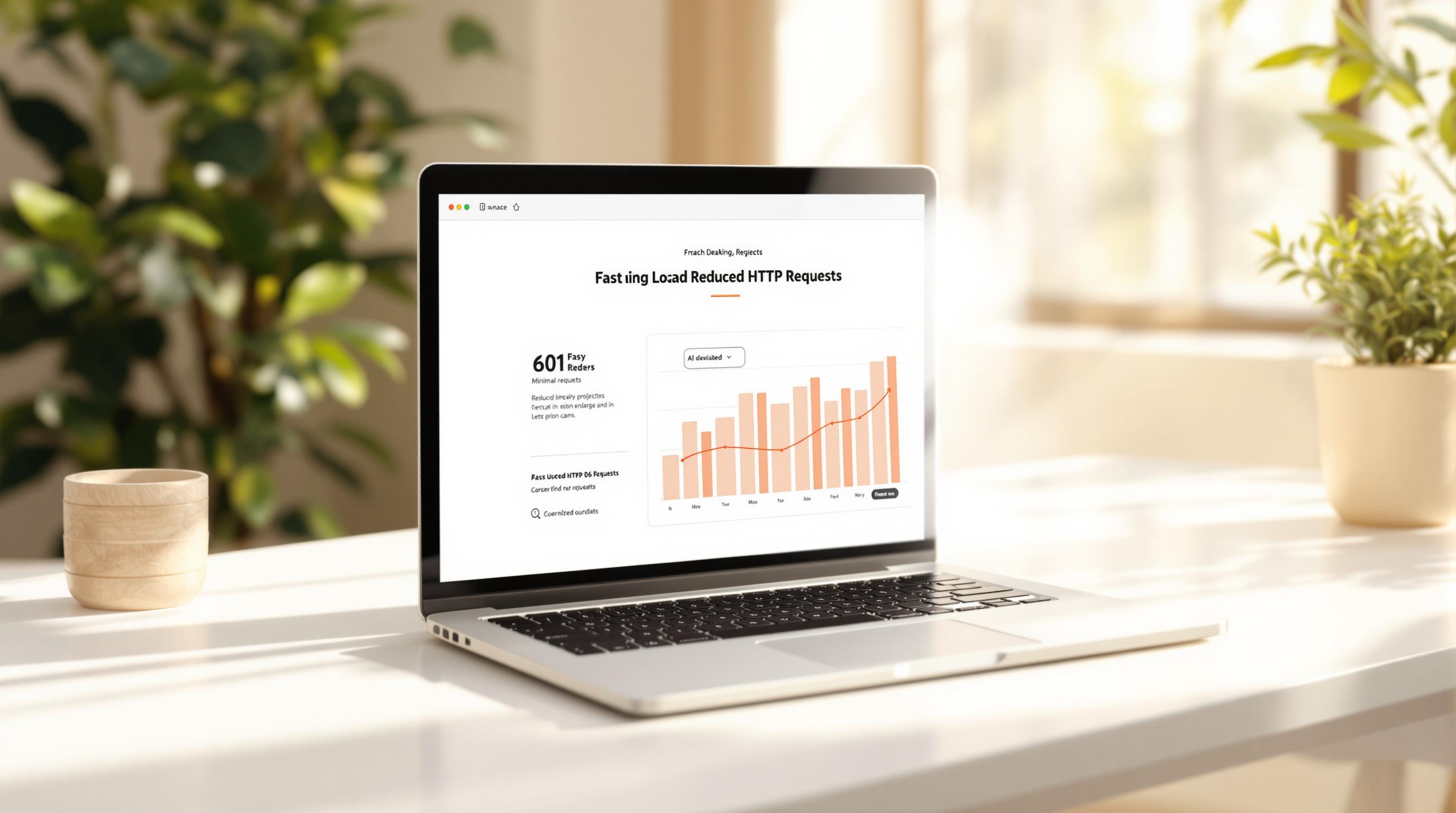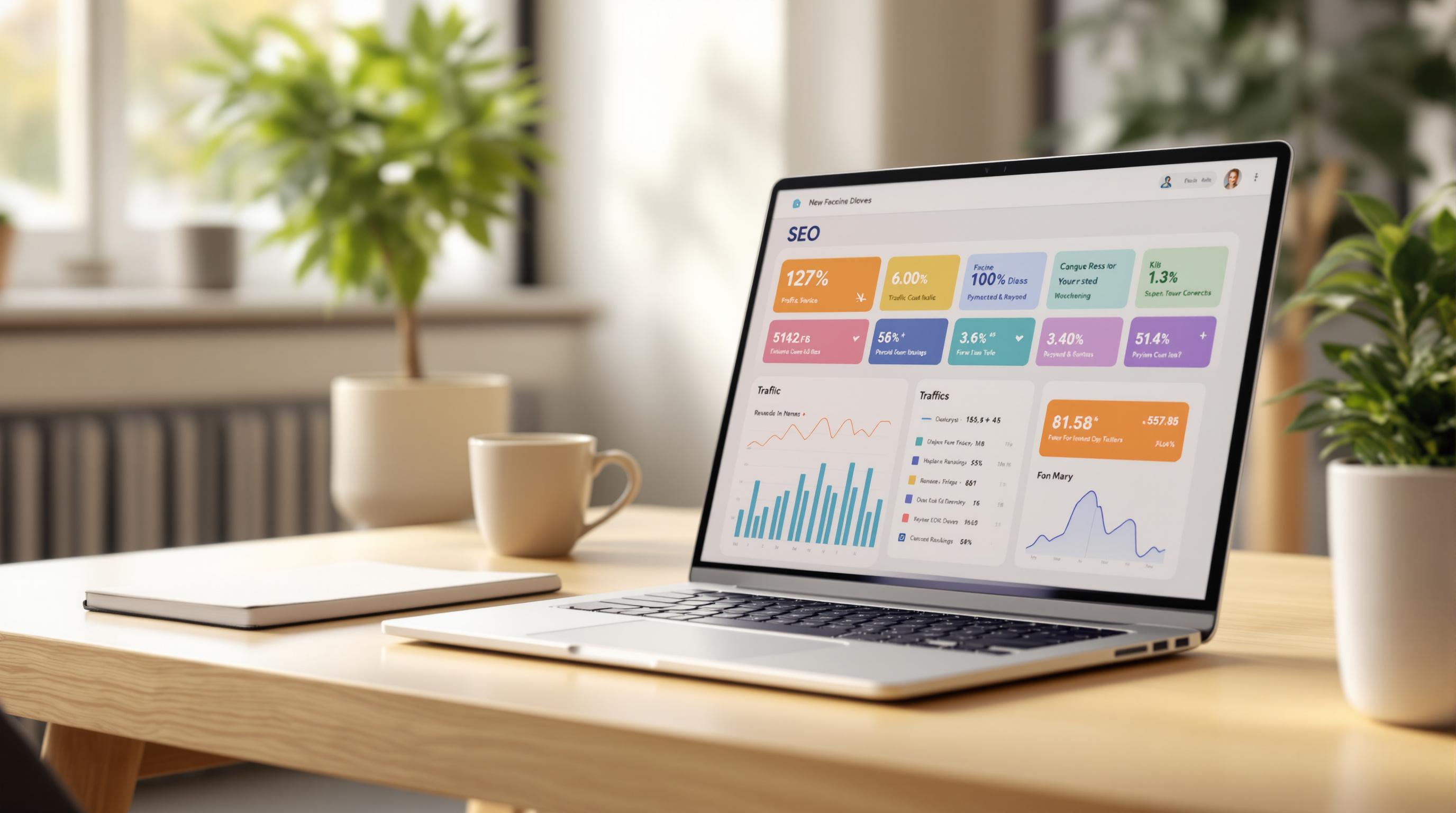Competitor keyword research helps you uncover the keywords driving traffic to your competitors, spot gaps in your content, and find new opportunities to grow your organic reach. This article breaks down 7 top tools to make competitor analysis easy, whether you're on a budget or managing enterprise-level SEO. Here's what you'll learn:
- SEMrush: Best for full-scale SEO and PPC analysis.
- Ahrefs: Ideal for backlink insights and content planning.
- SpyFu: Perfect for analyzing competitors' historical PPC strategies.
- KWFinder: Great for finding low-competition, long-tail keywords.
- BrightEdge: Enterprise-level tool with AI-driven insights.
- SE Ranking: Affordable option for small-to-medium businesses.
- BrightSide SEO: Managed competitor analysis for hands-off support.
Quick Comparison
| Tool | Best For | Starting Price | Key Features |
|---|---|---|---|
| SEMrush | All-around SEO & PPC strategies | $120/month | Keyword Gap, Position Tracking, Magic Tool |
| Ahrefs | Backlink & content analysis | $99/month | Content Gap, Site Explorer, Keywords Explorer |
| SpyFu | Historical PPC insights | $39/month | Kombat, AdWords History, Domain Analysis |
| KWFinder | Long-tail keyword research | $29.90/month | Keyword Difficulty, SERP Analysis, Questions |
| BrightEdge | Enterprise-level SEO | Custom Pricing | Share of Voice, ContentIQ, DataCube |
| SE Ranking | SMB-friendly SEO tools | $39.20/month | Keyword Efficiency Index, Rank Tracking |
| BrightSide SEO | Expert-managed analysis | $599/month | Hands-on strategy and implementation |
Use this guide to pick the tool that fits your goals, budget, and expertise. Whether you're a beginner or an enterprise, there's a solution here for you.
How To Check Competitor Keywords (Using Ahrefs & Semrush)
1. SEMrush
SEMrush is a leading tool for competitor keyword research, offering access to a database of over 21 billion keywords across 130 countries [7]. Recognized as the "Best SEO Suite" in the 2023 US Search Awards [1], SEMrush excels at helping users analyze and replicate competitor strategies.
One of its key features, the Organic Research tool, provides a detailed look at competitors' keyword profiles. The Keyword Gap tool allows you to compare up to five domains, highlighting shared keywords and areas where competitors rank but you don't [5]. Here's a quick breakdown:
| Analysis Type | Insights Provided |
|---|---|
| Keyword Overlap | Identifies keywords both you and competitors rank for |
| Unique Opportunities | Shows keywords competitors rank for, but you don’t |
The Position Tracking feature takes it further by monitoring daily ranking changes for your site and up to five competitors [9]. This real-time tracking pairs well with the strategic insights from the Keyword Gap tool.
For finding new keyword opportunities, the Keyword Magic Tool taps into its massive database of over 20 billion terms [2][10]. It delivers metrics like search volume, keyword difficulty, and CPC, helping you decide which keywords to target for maximum impact.
Pricing Plans:
- Pro: $120/month – Ideal for basic competitor tracking
- Guru: $230/month – Includes historical data
- Business: $450/month – Designed for enterprise-level needs
While the platform's interface can feel overwhelming for beginners, SEMrush has earned a solid 4.6/5 rating on G2, based on feedback from over 3,800 users [8]. It's a go-to tool for SEO professionals looking to refine their strategies.
2. Ahrefs
Ahrefs is a go-to tool for digging deep into competitor keyword research. While SEMrush covers a wider range of SEO tasks, Ahrefs shines when it comes to detailed competitor keyword analysis, thanks to its frequently updated index.
The Content Gap tool lets you compare up to 10 competitor domains at once, uncovering missed ranking opportunities. This feature outperforms SEMrush's 5-domain limit, making it perfect for tackling complex competitive environments. Combine this with the Site Explorer tool, and you can track historical ranking trends to understand competitors' long-term keyword strategies.
The Site Explorer also provides a detailed look at competitors' organic search performance. Its historical ranking data helps you see how their strategies have evolved over time [3][4]. This kind of insight is incredibly useful for planning your next move.
If you’re hunting for new keywords, the Keywords Explorer tool delivers. It offers detailed metrics and filtering options to help you focus on the most promising opportunities [2].
Pricing Structure:
Ahrefs offers plans starting at $99/month (Lite) and going up to $999/month (Enterprise), depending on your analysis needs.
Though it has a bit of a learning curve, Ahrefs is packed with detailed data and updates backlink information every 15-30 minutes [1], making it a must-have for anyone serious about competitor keyword research.
3. SpyFu

SpyFu is a go-to tool for businesses focused on analyzing competitors' historical ad strategies. It specializes in competitive intelligence, offering broad keyword and domain insights.
One standout feature is Kombat, which lets you compare up to three domains at once to identify shared and unique keywords. This visual tool helps uncover keyword opportunities that might otherwise go unnoticed [12].
SpyFu also provides access to up to 10 years of historical data, making it easy to track how competitors' keyword strategies have shifted over time [13]. It supports both organic and paid search analysis, with its AdWords History feature offering a deep dive into competitors' Google Ads history, including past ad copy and keywords [11].
Pricing Plans:
- Basic: $39/month (annual) or $59/month - Includes unlimited searches and data exports.
- Professional: $79/month (annual) or $119/month - Offers custom reporting and expanded data access.
- Team: $299/month (annual) or $449/month - Provides API access and multi-user support.
SpyFu’s interface is designed to balance functionality with ease of use. It has a 4.5/5 star rating from 237 G2 reviews [6], thanks to its intuitive dashboard and helpful onboarding features like guided tours.
The platform integrates with Google tools and supports custom-branded reporting, making it a great fit for agencies. A Chrome extension also provides instant competitor insights while browsing, making SpyFu a solid choice for businesses tracking competitors' keyword strategies [13].
4. KWFinder by Mangools

KWFinder stands out for its focus on finding precise long-tail keywords, offering a user-friendly way to analyze competitor keywords while packing a lot of power under the hood.
One of its key features is the Keyword Difficulty (KD) score. This score, on a scale of 0 to 100, helps you spot low-competition keywords by analyzing the Domain Authority and Page Authority of top-ranking pages [2][4].
Its real strength lies in its ability to uncover question-based keywords through the "Questions" feature. This makes it a great tool for identifying gaps in your competitors' content [3].
KWFinder also includes a domain comparison tool that provides insights into competitor ranking trends. Here’s what it offers:
- Domain Comparison: See how keywords rank across multiple competitor domains.
- SERP Analysis: Dive into competitor page rankings and SERP features.
- Keyword Gap Detection: Find keywords your competitors rank for that you might be missing.
- Local Search Analysis: Focus on location-specific keywords for better targeting.
The platform updates monthly search volume data using information from Google Keyword Planner and other reliable sources [2][11]. It’s particularly accurate for English-language keywords.
Pricing Plans
- Basic: $29.90/month (billed annually)
- Premium: $39.90/month (billed annually)
- Agency: $79.90/month (billed annually)
KWFinder’s focus on localized and long-tail keywords makes it a strong choice for marketers looking to refine their strategy. BrightEdge offers...
sbb-itb-d7fe25c
5. BrightEdge

BrightEdge is designed for enterprise teams that need large-scale analysis. Using its DataCube technology, it processes an impressive 3 billion keywords and 310 million domains, providing valuable insights for both organic and paid strategies.
One standout feature is Share of Voice, which tracks how visible your brand is compared to competitors across various keywords and topics [3]. This tool helps businesses monitor shifts in market position by analyzing:
- Organic visibility percentages
- Market share trends
- Keyword strategy gaps
Another key feature, ContentIQ, focuses on technical SEO. It identifies content gaps and opportunities by evaluating competitor content, offering actionable insights for improvement.
| Analysis Type | Insights Provided |
|---|---|
| Organic Keywords | Keywords competitors rank for |
| SERP Features | Visibility in snippets and local results |
| Content Performance | Top-performing topics and keywords |
| Geographic Data | Performance metrics by location |
| Device Segmentation | Rankings on desktop vs. mobile |
BrightEdge also leverages AI through its DataMind feature. This tool predicts rankings using Blended Rank scores, assesses content difficulty, and identifies quick wins [7].
"BrightEdge's ContentIQ feature provides more in-depth technical SEO analysis compared to many other tools in the market" [3]
While it requires more onboarding than some mainstream tools, BrightEdge is tailored for large organizations that need detailed market intelligence. Though it may not be ideal for smaller businesses, it’s a powerful option for enterprises managing complex analytics.
6. SE Ranking

SE Ranking stands out with its daily rank tracking and a massive database of over 2 billion keywords[3]. It's designed for small to medium businesses, offering both affordability and in-depth features, unlike BrightEdge, which focuses on enterprise-level solutions.
The Competitor SEO/PPC Analysis feature gives insights into both organic and paid search strategies. You can dive into competitors' domains to uncover data on ranking keywords, estimated traffic, and content performance[9]. For a more detailed look, the Competitor Comparison feature allows side-by-side analysis of up to five competitors' keyword strategies[9][3], making it easier to spot gaps in your own keyword plan.
A standout tool here is the Keyword Efficiency Index (KEI). This proprietary metric evaluates keyword potential by analyzing search volume and competition[9][3]. It's perfect for prioritizing keywords that can deliver the best results.
| Feature | Capability | Benefit |
|---|---|---|
| Keyword Grouper | Automatically clusters related terms | Simplifies content planning |
| Local SEO Tools | Tracks keywords by location | Improves local market targeting |
| White Label Reports | Customizable branded reports | Ideal for client presentations |
The On-Page SEO Checker is another powerful tool. It evaluates your pages while showing competitors' content performance metrics side-by-side[7], making it easier to understand and replicate what works in your niche.
For agencies handling multiple clients, the platform includes automated white-label reporting[9][3]. With pricing starting at $39.20/month (billed annually), SE Ranking is 38% cheaper than premium tools like SEMrush[8][9], making it a cost-effective option for businesses.
Daily rank updates[3] ensure you always have actionable insights at your fingertips.
7. BrightSide SEO

BrightSide SEO is ideal for teams that prefer hands-on expertise over self-service platforms. They specialize in managed competitor analysis, combining professional insights with direct implementation to help businesses stay ahead.
Their plans include keyword tracking and competitor performance monitoring, with options to suit different needs:
| Plan | Keywords | Blog Posts | Price/Month |
|---|---|---|---|
| Starter | 10 | 5 | $599 |
| Growth | 20 | 10 | $899 |
| Premium | 30 | 15 | $1,399 |
BrightSide SEO works with businesses of all sizes, from startups to large enterprises, crafting strategies tailored to their goals [1]. Instead of relying solely on automated tools, they focus on delivering actionable insights through expert analysis.
This approach complements tools like SEMrush and Ahrefs, offering businesses a more personalized experience. What sets BrightSide SEO apart is their commitment to implementing recommendations for clients, ensuring progress without requiring users to navigate complex data on their own.
Tool Features and Pricing Overview
Here’s a breakdown of how these tools stack up for different needs:
| Tool | Key Feature | Best For |
|---|---|---|
| SEMrush | Multi-channel keyword insights | Full-scale marketing teams |
| Ahrefs | Link-focused content analysis | Content strategists |
| SpyFu | Historical PPC data | Paid search experts |
| KWFinder | Easy-to-use interface | Long-tail keyword enthusiasts |
| BrightEdge | AI-driven enterprise analytics | Large organizations |
| SE Ranking | Rank tracking + content gaps | Budget-conscious businesses |
Key Features by Tool
Each tool brings something unique to the table:
- SEMrush: Combines SEO and PPC analytics for a well-rounded marketing approach.
- Ahrefs: Monitors link-building trends and backlink opportunities.
- SpyFu: Dives deep into competitors' PPC strategies, even from years ago.
- KWFinder: Focuses on simplicity, highlighting low-competition keywords visually.
- BrightEdge: Uses AI to forecast ranking shifts and deliver enterprise-level solutions.
- SE Ranking: Merges SEO audits with keyword efficiency index (KEI) scoring.
Tool Highlights
SEMrush offers an extensive keyword database and tools for managing multiple marketing channels. It's a go-to for teams juggling SEO, PPC, and other digital strategies.
Ahrefs is unmatched in backlink analysis, making it an essential tool for strategists focused on link-building and content opportunities.
SpyFu specializes in competitor PPC analysis, revealing insights into advertising history and keyword performance over time.
KWFinder is ideal for beginners or those seeking straightforward keyword research. Its user-friendly interface ensures actionable insights without overwhelming complexity.
BrightEdge caters to enterprises, offering tailored solutions and AI-driven insights. While its pricing starts around $3,000-$5,000 per month [8], it includes features like dedicated account managers, making it a solid choice for larger teams.
SE Ranking strikes a balance between affordability and functionality. Starting at $39/month, it’s great for smaller businesses needing core SEO tools like keyword tracking and site audits.
When choosing a tool, think about your team's specific needs, budget, and expertise. While tools like SEMrush and Ahrefs provide all-encompassing features, options like KWFinder and SE Ranking are better for those looking for effective yet budget-friendly solutions.
Summary and Recommendations
Pick tools that align with your team's size, objectives, and budget:
For Enterprise Organizations
SEMrush and BrightEdge are ideal for large-scale SEO efforts. They’re equipped to manage extensive analysis and enterprise-level strategies.
For Mid-Size Businesses
Ahrefs is a strong choice for content planning and backlink analysis. With a 4.7/5 rating on Capterra [14], it’s perfect for teams needing regular competitive insights.
For Small Businesses and Startups
KWFinder and SE Ranking offer essential features at affordable prices, making them practical for smaller teams. SpyFu is another great option, especially for competitor advertising analysis.
Decision Framework
Here’s a quick comparison to help match tools to your needs:
| Business Size | Recommended Tool | Best For | Starting Price |
|---|---|---|---|
| Enterprise | SEMrush/BrightEdge | Comprehensive marketing efforts | $119.95/Custom |
| Mid-Size | Ahrefs | Content and backlink insights | $99/month |
| Small/Startup | KWFinder/SE Ranking | Budget-friendly tracking | $29.90/$18.60 |
| PPC Focus | SpyFu | Advertising strategies | $39/month |
Key Selection Criteria
When choosing a tool, consider:
- Your marketing focus: organic search or PPC
- Team expertise: ensure the platform matches your team’s skill level
- Budget limits: select tools that fit your financial plan
- Reporting needs: pick tools with the reporting features you require
Make use of trial periods to test how well a tool fits into your workflow. These suggestions underline the article's main point: focusing on strategic keyword analysis is essential for staying competitive.
FAQs
Which tool is best for keyword research?
It depends on your needs. SEMrush stands out for its all-around capabilities (4.6/5 rating on G2). If you're looking for enterprise-level insights powered by AI, BrightEdge is a strong contender. For budget-friendly long-tail keyword research, KWFinder is a great option at $29.90/month. Meanwhile, BrightSide SEO combines tool-driven insights with expert guidance, making it ideal for teams that need extra support.
Which keyword tool is the most accurate?
Google Keyword Planner is often regarded as the most accurate for baseline search volumes [7]. However, using it alongside other tools can yield better results. For example:
- Ahrefs is excellent for recent data.
- SEMrush shines in PPC cross-analysis.
- Google Keyword Planner provides foundational volume data.
Each tool excels in specific areas, so a multi-tool strategy works well for verifying data and gaining a deeper understanding of your competition [3].


